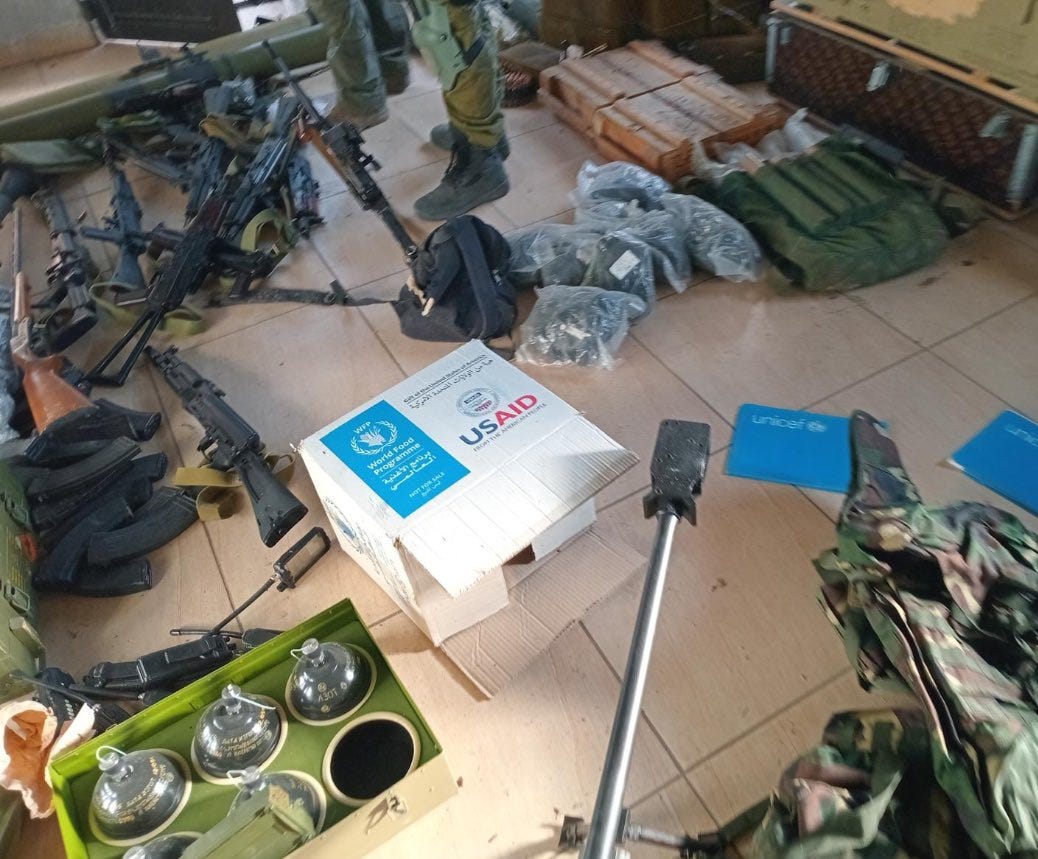Weaponized Aid: How Hezbollah Diverts Humanitarian Assistance for Terror
USAID and UN Packages Found in Hezbollah Weapons Caches Raise Alarms Over Aid Misuse in Lebanon

Last week, Asher Fredman, Director for Israel at the Abraham Accords Peace Institute and an expert with the Misgav Institute for National Security and Zionist Strategy, reported finding USAID humanitarian packages amidst a Hezbollah weapons cache in a village in southern Lebanon during his reserve duty service in the Israel Defense Forces. The incident “reflects the way that terrorist organizations like Hezbollah and Hamas take advantage of U.N. and Western aid agencies, while advancing their anti-Israel terror," Fredman told the Jewish Onliner.
The cache, which included sniper rifles, anti-tank missiles, and explosives, was allegedly found alongside boxes marked with the unmistakable logo of USAID, as well as materials from UNICEF. This discovery is part of a broader pattern, with Western charities and organizations, such as the World Food Programme, found to be providing direct or indirect support to Hezbollah, further enabling the group's violent operations. These humanitarian supplies, intended to provide for the basic needs of refugees and communities in Lebanon, are being diverted by the Iran-backed terror group for its military purposes, including the establishment of forward bases for potential attacks on Israel. Meanwhile, President Trump is in the process of dismantling USAID, which gives out humanitarian assistance to countries overseas.
Hezbollah’s Tactical Use of Humanitarian Aid
Hezbollah has long been known to exploit resources meant for civilian populations, and this recent discovery highlights the scale and sophistication of its operations. From diverting food packages to weaponizing medical supplies, the terror group has consistently taken advantage of international goodwill to fund its violent agenda.
On October 13, 2024, a video was circulated showing a Hezbollah weapons cache seized by the IDF in Lebanon. Among the items displayed was a package bearing the logos of USAID and the UN’s World Food Programme (WFP). This is just one example of how Hezbollah continues to use humanitarian aid for its military purposes.
One of the most troubling aspects of this abuse is the apparent ease with which Hezbollah has been able to integrate itself into the networks of international aid organizations. In 2024, NGO Monitor, a think tank that investigates nonprofit organizations with links to terrorism, raised alarms about the systematic diversion of aid in regions like Lebanon, Gaza, and Yemen. Gerald Steinberg, the founder of NGO Monitor, claimed that humanitarian organizations, including USAID and the World Food Programme (WFP), have been unaware or unwilling to address these serious issues of aid misappropriation, even as funds continue to flow into Hezbollah-controlled areas. In October 2024, Secretary of State Antony Blinken announced that the U.S. would provide nearly $157 million in assistance to Lebanon through the State Department and USAID. This bears the question of how much of this assistance has been diverted to Hezbollah or other terrorist groups

The Orphans Project Lebanon: A Revealed Terrorist Fundraising Network
In 2009, reports from the European Foundation for Democracy (EFD) revealed that the Orphans Project Lebanon, based in Germany, was raising funds that were directed to the Al-Shahid Association, a group with deep ties to Hezbollah. The Al-Shahid Association, disguised as a humanitarian charity, promotes violent extremism by providing financial support to families of Hezbollah operatives, including those who commit suicide bombings. In 2014, Orphans Project Lebanon, was banned by German authorities who uncovered Hezbollah paraphernalia, gold coins, and bank accounts containing large amounts of cash at locations used by the group. The fact that donations to the Orphans Project Lebanon were tax-deductible in Germany made the situation even more alarming.
What Can be Done?
The case of Hezbollah’s exploitation of humanitarian aid and financial assistance underscores a critical failure in the global oversight of aid distribution. Despite the best efforts of organizations like USAID and the UN’s World Food Programme, there seems to be an inherent vulnerability in the system that allows groups like Hezbollah to divert resources for their own benefit. To protect the integrity of aid systems and prevent further atrocities, it is essential that governments, humanitarian organizations, and the international community take immediate and decisive action to strengthen oversight and ensure that resources are not diverted to terrorist groups.


